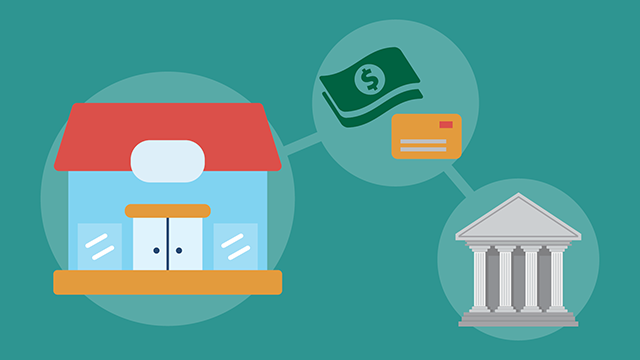A Step-by-Step Refine for Getting Pre Approval Student Loans
A Step-by-Step Refine for Getting Pre Approval Student Loans
Blog Article
The Duty of Credit History in Securing Small Company Loans for Business Owners
In the affordable landscape of entrepreneurship, safeguarding a small company finance commonly rests on the critical factor of credit report ratings. These scores act as a numerical depiction of an entrepreneur's credit reliability, affecting loan providers' choices and the terms supplied. A higher credit rating rating can open doors to desirable funding conditions, while a lower score may offer substantial obstacles. Yet, what specifically impacts these ratings, and how can entrepreneurs purposefully improve them to boost their opportunities of securing important funding? The answers to these questions hold the key to unlocking prospective growth opportunities for small companies.
Understanding Credit Scores
Credit report are essential mathematical depictions of an individual's creditworthiness, acting as an essential factor in financial decision-making for loan providers. These scores are originated from a comprehensive evaluation of an individual's credit report, including elements such as payment background, credit report usage, length of credit rating, brand-new charge account, and kinds of credit used. Normally ranging from 300 to 850, greater scores represent lower risk to lenders, while lower scores show greater threat.
The computation of credit history is carried out by credit bureaus making use of exclusive formulas, with the most widely acknowledged models being FICO and VantageScore. Each version might weigh factors somewhat differently, however they all purpose to offer a constant action of credit report risk. A strong credit rating shows the person's integrity in handling debt, making prompt repayments, and keeping a healthy balance in between debt made use of and offered credit history.
It is crucial for individuals and entrepreneur to comprehend their credit report scores, as these figures can have far-reaching effects beyond personal finance. Routinely monitoring one's credit report, correcting errors, and adopting audio monetary behaviors can considerably improve credit rating, consequently boosting the individual's general financial account and creditworthiness.
Importance for Lending Authorization
Recognizing one's credit rating is fundamental, as it plays a significant function in the procedure of car loan authorization for local business. Lenders make use of credit history as a key statistics to assess the credit reliability of candidates. A strong credit report rating suggests a history of accountable monetary habits, recommending to lenders that the applicant is most likely to settle the funding on time. A high credit report rating can considerably improve a business owner's opportunities of securing a financing with positive terms, consisting of reduced interest rates and even more flexible payment choices.
In comparison, a reduced credit history score could signify possible danger, leading lending institutions to either deny the lending application or impose stricter conditions. This makes it imperative for entrepreneurs to be aware of their credit history standing, as it straight influences their capacity to gain access to resources. Credit history ratings offer as a standardized action that makes it possible for loan providers to simplify their decision-making procedure, making sure performance and consistency. As small companies usually call for prompt access to funds for growth and sustainability, preserving a robust credit history comes to be necessary. Hence, understanding and taking care of one's credit history is a vital component of getting ready for lending applications and attaining organization success.
Elements Influencing Ratings
A number of variables add to the decision of a credit score, each playing an essential role in shaping a person's credit report profile. A high proportion of used credit report to available credit rating can recommend financial overextension, detrimentally impacting creditworthiness.
Size of credit rating history likewise factors right into credit report estimations, with a longer credit report normally seen more favorably. This statistics gives insight right into the individual's lasting financial habits, offering lending institutions a wider point of view on their credit monitoring skills. Additionally, the kinds of credit report being used are considered, as a mix of credit rating accounts, such as rotating bank card and installment financings, can demonstrate the capacity to take care of different monetary responsibilities.
Finally, current credit rating inquiries might influence scores (pre approval student loans). Regular applications for new credit report can show monetary distress, therefore adversely impacting ball game. Each of these components is essential in the comprehensive assessment of a credit rating, impacting an entrepreneur's capacity to secure a bank loan
Improving Your Credit History
Increasing one's credit report rating is similar to supporting a garden; careful interest to vital locations can generate significant renovations. Settlement history makes up a considerable part of a debt score; hence, setting up automated payments or reminders can assist preserve consistency. High credit rating application ratios, or the amount of credit score used relative to the debt limitation, can negatively impact scores.

Lastly, maintaining my latest blog post older charge account can positively affect the ordinary age of credit report, which is another element in scoring versions. While brand-new debt inquiries need to be lessened to prevent short-lived score dips, liable credit scores administration gradually will naturally cause score enhancement, thus boosting eligibility for favorable bank loan terms.
Alternative Funding Choices
Navigating the globe of local business funding frequently needs checking out alternate choices past typical financial institution financings. Business owners with less-than-ideal credit history may find these alternatives not only much more accessible yet also tailored to their one-of-a-kind organization requirements. Among one of the most popular choices are on the internet lending institutions, which have actually multiplied in the last few years. These systems normally use much faster authorization procedures and even more adaptable terms than standard financial institutions, often considering variables past credit report, such as business efficiency and cash circulation.
In addition, microloans, usually provided by not-for-profit companies, cater to little services and start-ups. They supply smaller sized car loan quantities with lower interest prices, making them perfect for business owners that need minimal capital.
Billing funding and vendor cash advances are likewise worth thinking about. The previous entails marketing impressive invoices to a lending institution at a price cut, while the latter offers an advancement on future sales. Both choices can improve cash money circulation without the strict credit scores demands of traditional car loans.
Final Thought

These ratings are obtained from a thorough evaluation of a person's credit report background, encompassing facets such as repayment background, credit report use, length of credit rating background, brand-new credit history accounts, and kinds of credit score used (pre approval student loans). A strong credit scores score reflects the person's dependability in managing financial debt, making timely payments, and preserving a healthy and balanced balance in between debt utilized and offered credit rating

Report this page